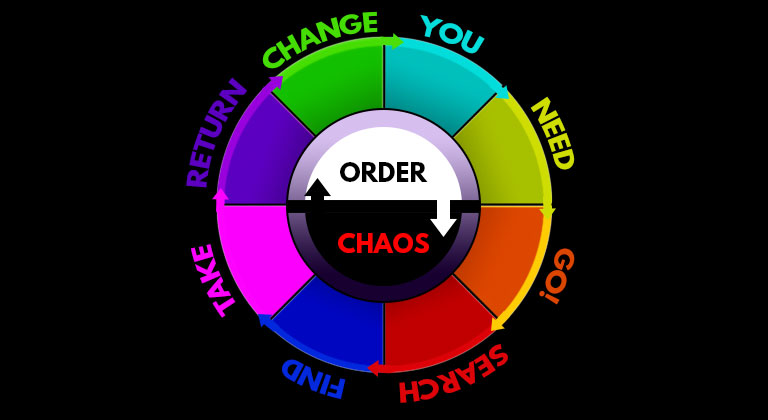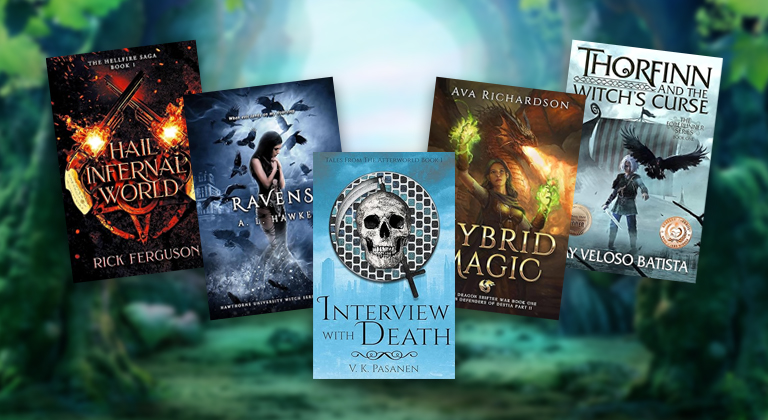Author Spotlight Interview: Christian Angeles
While many of our author interviews are of interest more to readers of that author or that author’s genre, this one may have some particular interest to other authors – especially those that are interested in scriptwriting. Today, Ginger sits down with scriptwriter Christian Angeles to chat about his focus on the ‘mono-myth’ and how it has impacted his writing and career. Ginger has some particular experience with Christian, as he explains below.
A while ago, we wrote about the importance of socializing with other writers, and it was being part of a writing group that led me to discovering the all-important Dan Harmon Story Circle – which has proved to be a game changer for my writing. Today, I’m excited to interview the man who taught that segment to our writing group – scriptwriter, reviewer, and reporter Christian Angeles. In addition to articles in New Brunswick Today and his reviews on Good Reads, Christian is the master of storytelling – which is, as I’ve mentioned, a skill I believe is more important than writing, and essential for authors to master.
HG: Tell me who you are, how you describe yourself and what you do in terms of storytelling.
CA: Hi, I’m Christian Angeles and I’m a script writer and entertainment reviewer. In terms of storytelling, I enjoy making well-crafted stories. Building characters and weaving emotional beats together. There are a lot of truths I find that I can’t convey in real life and can only express through my fiction. For me, the work is my purest form of expression. My Truth with a capital T.
HG: Okay, so I wanted to interview you because of the monomythic series. First off, tell me about Workprint, what you do with them, and where monomythic fits in?
CA: The Workprint is an entertainment review site that covers an array of topics from TV shows, Movies, Video Games, Comics, and Books. We also attend a good amount of conventions and podcast about a varying degree of entertainment topics. Monomythic, the series that I created, was an idea I pitched to the editor of the site a bit over a year ago. Basically, it’s a place where I discuss screenwriting: the craft and where to begin for anyone who’d like to begin writing their screenplay. It’s a lot of lessons, suggestions, useful tools, and personal experiences all related to screenwriting that I hope helps someone on their own writing journey. It’s also entirely free.
HG: Tell me – why did you focus on the monomythic story structure as something to write about? It’s MASSIVELY useful to writers like me – you’ve changed the game completely for my writing – but what inspired you to explore this for the benefit of other storytellers?
CA: So, there’s a book written by Joseph Campbell called ‘The Heroes Journey’ which focuses on the monomythic story structure. The gist of it being, that every story ever told has been told and so here is the overlying pattern.
A lot of writers have used this book as a tool to begin crafting their stories as it’s proven to be helpful. Especially when it comes to plotting. There are also a lot of writers that unintentionally plot in monomythic structure, my favorite author, Neil Gaiman, being one of them, but so have many acclaimed authors such as J.K. Rowling, Tolkien, Charlies Dickens, and Earnest Hemingway. Though to be frank, I don’t think these authors intentionally followed the format. I believe it just naturally flows into westernized story structures, particularly those built upon Aristotle’s Poetics and his discourse about the three-act structure; how all works have a beginning, middle, and end.
Though I emphasize, there are also other methods of storytelling (just look at what Bollywood does for example). As such, ‘The Heroes Journey’ is sort of considered the storyteller’s bible in many academic circles when it comes to structure and a LOT of professional screenplay authors have written advice books based on its suggestions. So, I choose to call my segment monomythic because it’s a good starting tool. Though I must emphasize monomythic structure is more of a guideline than strict rules to adhere. The Heroes Journey itself, was not a book about how to write but more of a look at a series of patterns found throughout famous pieces of mythology. Personally, I just hope writers find out about it sooner rather than later as it’s useful if not to learn structure, than how to deconstruct it.
HG: How did YOU get into writing? What works are you proudest of, and where can we see them?
CA: I got into writing because I grew to greatly dislike academia as I was priming myself for a career in clinical psychology. Which is also why Campbell’s take on monomyths were in my radar as I was familiar with the works of Otto Rank and Carl Jung.
The thing about your early 20’s is that you’re looking for a truth. Something or someone to latch onto that’ll help represent who you’re trying to be, what is worth fighting for, and who are you going to inevitably become. It all felt so weighted at the time: to find something worthwhile to believe in. What happened to me, was that I was so frustrated in writing two honors theses — in two different departments mind you: sociology and psychology — that I got sick of going in loops regarding classic theory.
To make matters more complicated, the scientific portion of statistical analysis and data gathering in academia wasn’t to my satisfaction either, as it slowly unfolded to me that the entire department was less about actual science (in the humanities at least) and completely more about politics; with cohorts that secretly hated each other and backstabbed one another in disproving each other’s works. And out of all this toxicity — in my spare time — I found a book. A comic book actually, recommended to me, called ‘Sandman’ by Neil Gaiman.
This absolutely changed my life as some of the lessons and subjects within that comic, oddly enough, was entirely related to my studies in social and classic theory. Sort of skewing a lot of what I was dealing with on its own head — in particular, the notion of dualities. That through destruction comes creation, that life is meaningless without death, and that reality can only progress with the motivation of aspiring dreams. I quit both programs and shortly after began screenwriting. Driven by a new truth I’d discovered only through story. As for where you can find my works, that’s a long story but I’m building my portfolio site which I’m trying to get up and running this year.
HG: How did you discover the monomyth, and the hero’s journey, and the story circle and all that?
CA: As I mentioned, I discovered the monomyth for the first time in college though it wouldn’t be the last time. My first year after graduation I tore my Achilles tendon in an epic football playing accident where I played phenomenally – caught three touchdowns in mere minutes – but ended up bedridden for the next six months having outrun my now apparently aging joints. In that time, most of my friends moved on and began working in their careers — so I had nothing to do nor look forward to in life in a rather depressing and lonely period. But in that time, I read and discovered my first book on screenwriting: Save The Cat — a book which also incorporated a lot of monomythic lessons on structure.
I then choose to read The Heroes Journey that winter, mostly to see what all the fuss was about. When I was healthy and got my old jobs back, I started taking classes on screenwriting — which didn’t talk about Monomyths directly but did talk about Save The Cat — over at Middlesex County College. Through the class I’d also attended a film festival where I met a very encouraging Ed Asner — who was a very sweet old man and very much the character he played in ‘Up’. As per his suggestion, I started to ask the right questions to the right people, and then started to make on my own: a web series, a production company, and my first ever scripts to be sold — All of which, for better or worse, ended up in failure. Which was another lesson I needed to learn given my stellar academic record previously where I thought I knew everything… but didn’t.
Then I started taking classes at Upright Citizen’s Brigade and Gotham Writer’s Workshop, both based in Manhattan, which was tremendously helpful, the latter of which unironically, also talked about the Campbell Monomyth. After all of these courses and lessons, I finally felt comfortable in my screenwriting where I started submitting scripts to contests, one of which, was the NBC Writer’s on the Verge program. They asked for adapted spec scripts and I choose one of my favorite shows to write about: Rick and Morty. Being the diligent researcher that I am, I then found out that the show’s creator, Dan Harmon, was not only a fellow Campbell fan but used his simplified version of the Monomyth which he called his ‘Story Circle’.
The lesson from all this: The Monomyth is everywhere. Hence, why I talk about it!












